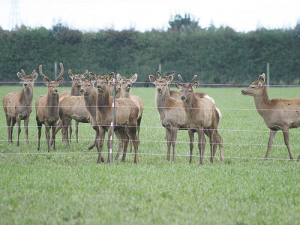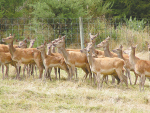An ANZ agri-report published this winter highlighted the industry’s continuing tight supply of livestock and growing global demand for venison as a red meat product.
Both were pushing the sector towards returns near all-time highs in the 2017-18 year, now cracking the $9/kg schedule price.
Deer Industry NZ reports the sector is enjoying a highly stable supply period, in contrast to about ten years ago when deer numbers and returns surged then plummeted, as did the farmed population. Then farmers’ returns spiked in 2008, driven by the weaker NZ dollar.
Over that time the sector has managed to achieve stability rarely seen in the red-meat sector -- an average schedule price of $7.40/kg.
In the past decade breeding hind numbers have declined almost every year; now they are at half their peak of 800,000. Similarly total slaughter numbers are levelling off at about 300,000 and are predicted not to reach 400,000 until 2019-20.
Bayleys rural agent Ben Turner, Canterbury, says he has a regular stream of inquirers for deer farms, but “the challenge for us is finding enough deer units to meet that interest”.
Canterbury suits the industry, with its steadied, high returns justifying the cost of fencing and yards on land ideal for deer fattening, he says.
“Possibly some of the hill country where sheep have typically been stocked may deliver a better return in deer.”
Farmers challenged over nitrogen losses in Canterbury may find deer a useful extra land use without such challenges.
Dan Coup, DeerNZ chief executive, says the industry doesn’t deserve a reputation for price volatility when the past decade has seen relatively steady returns despite variability within the year on schedule prices.
“The schedule is now at $9.00/kg and that is before our usual seasonal spring price peak.”
The supply-side tension coincides with growing consumption outside the traditional season and marketing has put the product in a ‘sweet spot’ for high, sustained returns.
NZ marketers’ efforts overseas have helped longer term, sustainable returns. These include wealthier parts of Asia, Scandinavia and North America.
The US has shown the strongest growth, its market volume share reaching 30%, and value share 25%, overtaking Germany. Canada and Austria have also grown well.
ANZ analysts say the rise of venison matches the consumer trend towards grass fed, high quality proteins that are not genetically modified and have not been treated with hormones or antibiotics. As the largest farm source of venison, NZ is well placed to supply markets which would otherwise buy wild game -- sporadic and unreliable -- during their main consumption periods.
Coup says the sector’s livestock supply is likely to remain tight for a couple of seasons, as the higher prices encourage farmers to retain stock and build breeding herd numbers.
“We have been through a period when land that may once have carried deer has replaced them with dairy support units.”
Some farms in Canterbury and Southland hill country with deer fences have gone to sheep and beef in the past.











